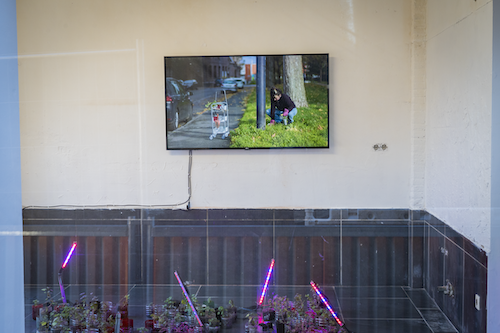-
The price is worth it
Acher
Boulevard d'Avroy 28-30
-
TO DO
Hilal Aydoğdu
100 Rue Saint-Gilles
-
V – 150360/1 p. 204, 265, 266
Dóra Benyó
1 Féronstrée
-
Fausse bonne nouvelle
Juan d’Oultremont
31b Rue de la Cathédrale
-
Et fouisse toujours on trouvera bien
Gaspard Husson
18 Rue de l'Etuve
-
La constellation du navire Argo
Sarah Illouz & Marius Escande
Hôtel de la Cour de Londres 40 Rue Hors-Château
-
One Line (… Better Than On – line!)
Marin Kasimir
31a Rue de la Cathédrale
-
Cityscape
Sarah Lauwers
29 Rue de l'Université
-
Traversées
Alexiane Le Roy
3 Rue de la Cathédrale
-
Mécanique d’un mur
Raphaël Maman
9 Passage Lemonnier
-
Vapeurs
Eva Mancuso
5 Rue Chéravoie
-
Don’t cry over spilllllled tears anymore
Francisca Markus
7 Rue Saint-Remy
-
Actions !
Maxence Mathieu
56 Rue Saint-Gilles
-
On ne peut rien faire d’autre que tenir debout
Élodie Merland
113 Rue de la Cathédrale
-
Travel Local, Buy Local
Oya
107 Féronstrée
-
Le vestiaire
Camille Peyré
85 Rue de la Cathédrale
-
22 empans et 1 palme
Leïla Pile
75 Rue Hors-Château
-
Chronique florale
Ionut Popa
101 Féronstrée
-
The Sunken Place
Louise Rauschenbach
4 Rue de la Cathédrale
-
Le temps d’une trace / La trace du temps
Florian Schaff Marvyn Brusson
1 Rue Courtois
-
Open closet archive 1995/2021/2023/2024
Bo Stokkermans
Passage Lemonnier, 37-39
-
Mutations x Urbaines
Adrien Mans Benjamin Ooms
17 Rue des Croisiers
-
Je m’organise…
Leen Vandierendonck
159 Féronstrée
-
Wer rettet die Welt
Paul Waak
16 Rue du Palais
-
Regarde… ce qu’il se passe à côté
Sculpture/Peinture B3 ESA Liège Melissa Andreia Alves ...
137-139 Féronstrée
-
Pauvre petit belge qui tremble
Paolo Gasparotto
25 Rue Saint Paul
Warning: Undefined array key "current_expo" in /var/www/clients/client3/web4/web/wp-content/themes/artaucentre/loop/vitrine.php on line 25

Mauvaises graines
#11
Julie Gaubert
Artist selected as part of the open call
2541 En Féronstrée
Abandoned plants on the edges of sidewalks and roads, accompanied by waste and exhaust pipes: nettles implacably resist. More than just resisting, they clean up the soil. Present in all seasons as if they were outside of time. Lively and robust, they adapt, warriors of hostile times. Mauvaises graines extracts these plants called weeds to cultivate them, take care of them, understand their importance. Are they still wild? Metaphor of social struggles, can we cultivate our struggles?
Behind the window, Mauvaises graines gives interest, attention to these “weeds”. They are exhibited, fantasized, admired. Disrupting their status as weeds, they take their place as stars, influencing their symbolic, social and therefore political value. Yet locked up, in gestation, are they waiting to break the window? Or is it a culture, apparently illegal, of hopes of resistance?
“Resistance, as we can see, does not always take the form of a frontal struggle. There are discrete, subtle micro-resistances, which rely on strategies of infiltration or cracking, capable of responding to what Foucault calls a “microphysics of power”[1]. Julie Gaubert’s Mauvaises graines hence certainly have a poetic dimension, but they are also the expression of a biopolitics of marginal beings who claim their independence. The permaculture of wild grasses collected in the “third landscapes” of Roubaix, which form the image of all subordinate populations, act of a capacity to self-organize collectively, in a self-managed way, outside of any governmentality.”
[1] He addresses this notion in Surveiller et Punir (Paris, Gallimard, 1975).